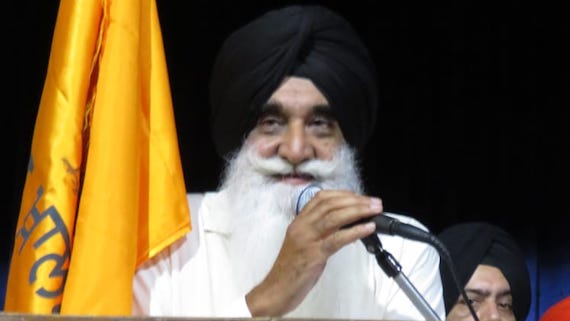General News
An Open Letter to Indian MPs: Abolish Bullying Laws Called Sedition, UAPA
May 5, 2020 | By Sikh Siyasat Bureau
Amritsar/Chandigarh: The Sikh organization, Dal Khalsa has written an open letter to all parliamentarians of India expressing serious concerns over the sudden surge in the cases against lawyers, journalists, student activists and rights defenders under draconian laws called sedition and UAPA.
In his letter Dal Khalsa president Harpal Singh Cheema has emphasised that though charges under these oppressive laws against dissenters and dissidents rarely withstood scrutiny of the courts yet the successive governments are (mis)using it till date to deny people their basic freedoms.

Dal Khalsa president Harpal Singh Cheema [File Photo]
The letter has listed rulings of Supreme Court in separate cases, critical views of M.K. Gandhi, suggestions by ex-Law Minister, recommendations of Law Commission and viewpoint of Amnesty on 124-A of IPC to buttress our call for repealing of bully laws and dropping of charges against Jamia students and Kashmiri journalists.
FULL TEXT OF LETTER READS AS FOLLOWS:
Dear Member Parliament:
Waheguru ji ka khalsa ! Waheguru ji ki Fateh !
The indiscriminate (mis)use of sedition and Unlawful Activities Prevention Act (UAPA) against lawyers, students, journalists and rights defenders has put ‘people’s freedom’ in peril.
Perturbed over the continuation of misuse of these laws as a weapon to silence the dissenting voices and critics of government’s divisive policies, I write to you as ‘people’s representatives’ with a hope that you will speak against injustices and witch-hunting. While writing to all parliamentarians, I am conscious of the fact that majority of you are part of the Government’s repressive decisions and those who sit on the opposition benches have lend their “unintentional” support to it by remaining silent.
The actions of the present day Government, in retribution, have painted the grim picture of Intolerant India. The latest is booking of Delhi Minority Commission chairman Zafarul Islam Khan under sedition charges by Delhi police on May 1, days after he posted remarks about persecution of Muslims in India on his social media.

Image used for representational purpose only | Source: Dal Khalsa
While the people are in the throes of an international crisis battling the spread of coronavirus, the rulers in Delhi are busy in targeting and fixing people of particular religion and ideology, whom they feel are ‘threat to their Hindutva hegemony’. Taking undue advantage of the countrywide lockdown, the Government has intensified its crackdown on people who stood steadfastly against CAA+NPR+NCR.
The gross misuse of these repressive laws is going on brazenly by powers that be. People across the spectrum have been booked under repressive laws under the pretext of their involvement allegedly in cow smuggling, praising Pakistan cricket team on their victory, refusing to chant Jan Gan Man or Bharat Mata ki Jai, opposing abrogation of article 370 & amendments in the Citizenship Act and deploring rights violation in Kashmir.

A poster released by Amnesty International India for demanding release of Safoora Zargar | Image used for representational purpose only | Source: Amnesty International India
The month of April 2020 has turned out to be the month of ‘sedition and UAPA’. Cases under these laws witnessed a surge and the targets were anti-CAA protesters. Delhi police have booked Meeran Haider and Safoora Zargar from Jamia Milia Islamia University and Umar Khalid of Jawaharlal Nehru University (JNU) under UAPA in connection with communal clashes in Delhi. Safoora, 27-year old research scholar is in the second trimester of her first pregnancy. After Khalid, the president of Jamia Millia Islamia Alumni Association Shifa-ur-Rehman has also been arrested under UAPA in connection with the same case. Another JNU PhD scholar Sharjeel Imam, who was in custody since Feb 16 under sedition charges for allegedly giving speech at AMU, has now been booked under UAPA in connection with two cases of violence at Jamia Millia Islamia on December 13 and 15.
Another student activist Gulifsha, 28 is languishing in New Delhi’s Tihar Jail for the last few weeks under anti-terror law UAPA. Her detention is part of a series of arrests in connection with communal clashes in Delhi.
In addition to these arrests, around 50 student activists, who have exercised their democratic right to protest against the discriminatory CAA are on the radar of Delhi police including leader of All India Students’ Association Kawalpreet Kaur. They are facing both physical and mental harassment.
Similarly, three journalists — The Hindu correspondent Peerzada Ashiq, freelance journalist Gowhar Geelani and photojournalist Masrat Zahra — have been booked under these bad laws in Jammu and Kashmir.
There are some commonalities in both cases. The police in J&K and Delhi are directly controlled by Union Home Ministry. Second dimension is the timing of all the FIR’s. And thirdly, all the arrested or booked persons are Muslims.
Regrettably, Jamia and JNU students have been charged under repressive laws for conspiring to incite the communal violence in Northeast Delhi in which 53 people were killed between Feb 23 and 26 while organizing the anti-CAA protests. They have been framed after two months of the incident. It’s a clear case of the state indulging in witch-hunting, while the real perpetrators, instigators and conspirators of Delhi violence are enjoying state patronage.
Apart from these cases, on April 10, the Punjab Police booked Gurpatwant Singh Pannun and his outlawed ‘Sikhs for Justice’ (SFJ) under UAPA for “seditious automated calls aimed at instigating the people against the state government. On April 14, two civil rights activists Gautam Navlakha and Anand Teltumbde surrendered before NIA on the orders of SC. They were booked under UAPA for inciting violence at Bhima- Koregaon village on Jan 1, 2018, in which seven activist’s lawyers and writers are already arrested by the Pune police.
Sedition law during British Times: B.G. Tilak was tried and convicted twice under sedition in 1897 and 1908 for spreading disaffection against the government. Maulana Mohammad Ali, Maulana Shaukat Ali and Shri Shankaracharya were tried jointly in 1921 at Karachi for sedition. In 1922, M.K.Gandhi had been charged under this section for articles he had written in his weekly publication ‘Young India’. In his famous trial that lasted for 100 minutes, Gandhi described Section 124-A as the “prince among the political sections of the Indian Penal Code”. In 1929, Gandhi called for a countrywide agitation demanding the repeal of the Section 124-A. The country called India that revered Gandhi its ‘father’ has failed to honour his words and scrap the law from statute even after 70 years of adoption of Indian Constitution.
TADA-POTA and then UAPA: One hundred and fifty years after the draconian law of sedition was introduced in the Indian Penal Code in 1870- as a tool of colonial domination and terror- it is being levelled in independent India at the alarming rate by all successive governments to stifle dissent and harass dissidents. In 2004, amidst public outcry against the misuse of the Prevention of Terrorism Act (POTA), the government repealed it, but majorly amended the Unlawful Activities (Prevention) Act at the same time. After amendments in 2008 and 2012, the UAPA was turned into a veiled new avatar of TADA and POTA.

Image used for representational purpose only
The amendments in UAPA, 2019 empowered the ruling government, under the garb of curbing terrorism, to impose indirect restriction on right of dissent which is detrimental for developing democratic society. Section 35 of the Act also violates the right to reputation — an integral part of the right to life, by terming or tagging an individual as ‘terrorist’ even before the commencement of trial.
The Supreme Court of India on several occasions has set the record straight by stating that ‘dissent is not sedition’. However, the present day governments and the police failed to implement the SC guidelines in letter and spirit.
IS THERE A CURE FOR BAD LAWS? WILL IT BE REPEALED?
India is slapping sedition charges against dissenters at a time when the draconian law is being either scrapped or made a dead letter in most modern constitutional democracies namely USA, UK, New Zealand, Australia.
In India, the police, politicians and the public have forgotten the SC’s interpretation that raising slogans or saying through words by itself does not constitute sedition. In a landmark judgement in 1962 in the case of Kedar Nath Singh v/s state of Bihar, the Supreme Court held that a citizen has a right to say or write whatever he likes about the government or its measures, by way of criticism or comment, so long as he does not incite people to violence.
In Balwant Singh v/s state of Punjab case in 1995, the SC says: “Raising slogans of Khalistan Zindabad or Raj Karega Khalsa a couple of times by two individuals without anything more did not constitute any threat to the GoI”.
Unfortunately, the police and even trail court have often failed to appreciate the line set by the SC. The apex court and high courts have set aside sedition charges time and again depreciating the manner in which the police had filed a FIR. Even the FIR under 124-A filed by Amritsar police against 22 members of the Dal Khalsa in June 2005 for undertaking march against army attack on Darbar Sahib was quashed by Punjab and Haryana High Court in Oct 2012.
In September 2012, two Sikh Nationalist leaders Kulbir Singh Barapind and Daljeet Singh were booked under UAPA on frivolous charges in two separate cases in Punjab. Both were acquitted by trail court in September 2014 and May 2016 respectively. However, the motive of the police was to keep them in jail as long as possible only to settle scores and teach them lessons for holding independent belief and thoughts.
The voices to repeal the sedition law and amend the repressive provisions of the UAPA, has gained currency from various quarters in the recent times. From Amnesty International to Editor’s Guild of India to civil society to the academics, journalists and editors working in different parts of the world, all have unanimously condemned the witch-hunting of Kashmiri Journalists and anti-CAA protesters by the Indian government. Amnesty International has termed the recent arrests as ‘attempts by the Indian authorities to criminalise the protest’.

Image used for representational purpose only | Source: Amnesty International India
Here, I would like to bring into your notice the suggestion cum recommendations made by former Law Minister and Law Commission in this regard. Law Commission, headed by former Supreme Court judge, Justice B.S. Chauhan, recommending the Govt in April 2018 to re-think or even repeal the provision of sedition (Section 124A) from the Indian Penal Code. In the wake of the arrest of social activist Binayak Sen, the then Law minister Veerappa Moily in April 2011 announced that there was a need to review the sedition law.
Will the Indian parliamentarians ever do away with these draconian laws just like they did with previous anti-terror laws like TADA and POTA?
In the end, I would like to quote French philosopher Voltaire: If you want good laws, burn those you have and make new ones.
We hope and pray for good health and safety of all in these terrible times of COVID-19 pandemic.
Yours sincerely
Harpal Singh Cheema
President, Dal Khalsa
To Get Sikh Siyasat News Alerts via WhatsApp:
(1) Save Our WhatsApp Number 0091-855-606-7689 to your phone contacts; and
(2) Send us Your Name via WhatsApp. Click Here to Send WhatsApp Message Now.
Sikh Siyasat is on Telegram Now. Subscribe to our Telegram Channel
Related Topics: Bhai Harpal Singh Cheema, Dal Khalsa, Harpal Singh Cheema, Indian Politics, Indian State, Kashmir, Narendra Modi Led BJP Government in India (2019-2024), Sedition, UAPA




